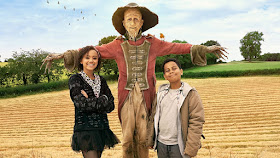There is a way to phrase a title that raises an expectation, to tell you about style, tone and content. For example, let's look at the early work of George Lucas, because it's an easy one.
Star Wars (as
Episode IV: A New Hope was simply called on release) is a pair of booming, declarative, internally alliterative monosyllables that almost have their own echo. It is the title of a film where a planet gets blown up, and if it does not disappoint in that department, that's less of a surprise than you might think. The title of
American Graffiti, meanwhile, suggests a sentimental approach to the indiscretions of youth – you may be ambivalent towards the concept of graffiti, or for that matter the concept of America, but juxtaposition of the two makes both better. Graffiti is just writing on walls, but
American graffiti is something to feel nostalgic for. On the other hand, there's something brutalist about
THX-1138. Something that evokes the mechanistic, the Soviet (or, more accurately, the Western idea of the Soviet). And indeed it's a bleak, chilly sort of film. Not Soviet, though.
THX-1138 is very much a capitalist dystopia. It's the future Elon Musk wants.
But. The point is, there's a lot in a title.
Repo Man.
Excalibur.
Jupiter Ascending. Dodgeball: A True Underdog Story. Apocalypse Now. The Shining. The title is a vital part of your engagement going in, and creates an expectation, or inspires investigation into a mystery, or simply tells you what sort of film you're watching.
It's actually very rare that a title is apparently made with the intention of wrongfooting you. And it's sort of complex how
The Man Who Killed Hitler and then the Bigfoot does that. To talk about those expectations, there will necessarily be, as ever, spoilers.




